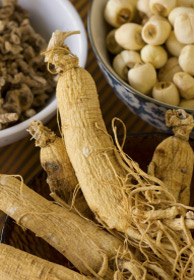Traditional Chinese Medicine

Traditional Chinese Medicine commonly known as TCM is not simply acupuncture or herbal medicine but is a whole understanding of health, disease, diagnosis and treatment which has been in existence for 5,000 years. From a TCM perspective a healthy person is one in which everything is in balance, and qi (energy) and blood flow freely without obstruction; illness occurs when there is imbalance in the body and/or when the normal flow of qi and blood are obstructed. This understanding does not dismiss the role of bacteria and viruses in disease. TCM has been well aware for 5,000 years of the role of exogenous pathogens in causing and spreading disease. However, how the body responds to these pathogens depends on the state of balance of the body. This can be illustrated by pointing out that if a thousand people were exposed to the same flu virus there would likely be a variety of responses. Some would be mildly ill but able to continue work, some may be laid up for a week with such symptoms as headache, fever, aching joints. Others may not be sick at all. Such variability may be dismissed simply as signs of a weaker or stronger immune system, either constitutionally or as reflection of the person’s degree of tiredness, stress etc. However in many cases this may be an oversimplification. Some people catch virtually every flu going around, some working in the same office may go several years without catching the flu. Some people get skin infections or worse every time they cut themselves working in the garden. But the person who catches every cold or flu going round is not necessarily the same person whose cuts get infected. The person susceptible to colds and flus has certain imbalances; the person who is susceptible to infected cuts has other imbalances. The immune system is not simply seen as a single system in TCM.
In treating a condition other than a localised muscular-skeletal condition with TCM, it is necessary to do a holistic diagnosis. The TCM practitioner does not treat according to the name of the condition, in other words he/she does not simply do a migraine treatment, insomnia treatment or irritable bowel treatment. A holistic diagnosis is necessary first, not to put a name to the condition but to determine what imbalances, obstructions etc are casing the condition. This is carried out by asking questions about anything and everything e.g eating, sleeping, digestion, bowel motions, sensitivity to heat and cold, seasonal variations in the condition, or time of day variations where applicable, as well as studying the tongue and pulse which can also give useful clues. Once the imbalances and/or obstructions are understood, a treatment principle can be established. Thus if the diagnosis found indications of deficient kidney yin, excess liver yang and blood stasis, the treatment principle would be to reinforce kidney yin, reduce liver yang and activate the blood. Acupoints/and or herbs that bring about those effects would then be selected to treat the condition.
Some ask how scientific TCM is. Over its thousands of years of existence the therapies of TCM has been tried tested and observed. Western medicine only discovered about 160 years ago that goitre could be treated with iodine. Yet TCM doctors were prescribing kelp seaweed which is iodine rich to treat goitre 3,000 years ago. Today, state owned research institutes in China carry out modern scientific type research into all aspects of TCM.
TCM is used to treat a wide range of medical conditions including digestive, respiratory, dermatological, gynaecological, haematogical, endocrinal etc. John is available at 03 5468733 or j.black@slingshot.co.nz to answer any questions you may have.